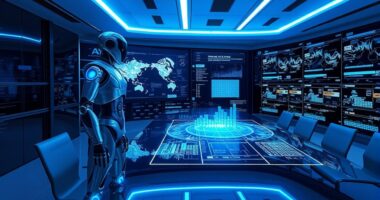Artificial Intelligence (AI) is the technology enabling machines to learn from either observation or firsthand experience. Essentially, AI systems have the ability to independently improve their performance as they assimilate new information. This technology is extensively applied in several fields such as healthcare, finance, and transportation.
One of the most common ways for AI systems to learn is through deep learning. Deep learning involves training a machine with large amounts of annotated data sets to recognize patterns and make deductions on its own. This approach is often used for tasks such as recognizing images or understanding natural language sentences. Other forms of AI include reinforcement learning and genetic algorithms.
Disadvantages of Artificial Intelligence
While AI can be a valuable asset, the technology is also prone to bias. AI systems learn from datasets, which may reflect assumptions or prejudices. Machines are therefore not fully capable of judging and making decisions in complex situations. While they can do many tasks that humans cannot, their inability to make judgments and bond with others is a major drawback.
Another drawback of AI is its high cost. It requires enormous investment and requires complex machinery, which requires large amounts of time and money to maintain. Furthermore, artificial intelligence software programs require frequent updates to adapt to the changing environment. Similarly, if AI software programs break down, they cost much money and time to repair.
Another disadvantage of artificial intelligence is that it cannot learn from experience. It may perform the same task repeatedly, leading to wear and tear. AI systems also need a large amount of data to function correctly, which can be difficult for them to do. As a result, they cannot adapt their performance to changing environments.
Another drawback of AI is that it cannot think creatively. While AI can learn from pre-fed data and previous experiences, it cannot be creative. For example, the Forbes earning reports written by the bot Quill are not original and lack the human touch. Moreover, AI programs are displacing humans from their jobs, which is causing high unemployment.
Although AI has its drawbacks, it can help solve many human problems. For example, earlier, AI-based technologies were used to diagnose and treat breast cancer. In addition to this, AI can also assist doctors in identifying cancer in an earlier stage. AI programs also improve the efficiency of medical diagnosis and reduce the risk of wrong diagnoses.
Although AI has many advantages, it cannot replace human creativity and originality. Its creators must be creative to make AI-based machines as efficient as possible. Furthermore, AI systems are subject to rules and algorithms that can limit their creative potential.
Common Questions About Artificial Intelligence
Artificial intelligence (AI) is a branch of computer science that deals with creating intelligent machines. Unlike traditional computers, AI does not require human intelligence; it can learn from experience and act accordingly. The question that arises is, “How does AI work?” The answer to this question depends on the particular application of AI in a particular context. One example of AI in action is in aidriven image generation, where algorithms are used to create realistic images from scratch. These algorithms can analyze and learn from existing images and then generate new ones that resemble the original. This is just one way that AI can be applied to produce impressive results in various industries, from entertainment and gaming to healthcare and business.
AI uses fuzzy logic, a form of reasoning that starts with a goal and works backward to arrive at a decision. Then, it asserts new facts that support the goal. This method resembles human reasoning in several ways. For example, it identifies situations where it is difficult to decide because the answers are vague. In a fuzzy case, it considers all possibilities between “Yes” and “No.”
While AI is a powerful tool for solving many everyday problems, it is not yet fully developed. There are many concerns associated with AI. While many media reports highlight potential dangers, they do not fully explain why such technologies are dangerous or need to be controlled. These fears are often based on readings such as Superintelligence by Nick Bostrom. While there are concerns about AI, it is essential to remember that progress is accelerating.
There are many critical applications of AI. Among them are advanced web search engines and recommendation systems. Big retailers use these systems to improve their business by supplying consumers with relevant offers. In addition to helping retailers optimize their business, these systems also improve their customer satisfaction. They do this by analyzing millions of pieces of data, which is collected from millions of users.
One of the most common questions about AI concerns the question of when AI systems will become intelligent. The answer depends on the amount of progress in AI research. Most researchers think that breakthroughs will occur in the next century or so. But that isn’t a sure bet. While AI is progressing rapidly and improving the quality of life, it is still far from perfect.
One of the biggest misconceptions about AI is that machine learning has supplanted AI. This misconception arises because machine learning has recently grown in popularity. However, AI has been at the heart of computer science for many years. It was first conceived of in 1840 in an English newspaper.
Impact of Artificial Intelligence in Gaming
Artificial intelligence (AI) is becoming an important part of many video games. It can help players understand in-game actions and make the games more realistic. AI can also help players to adapt to the game. These features improve the gaming experience and increase player satisfaction. In recent years, AI has created more realistic graphics, characters, and maps.
AI can be used in games to create sophisticated simulations and realistic character interactions. It can be applied to a wide variety of game genres, and it can also improve the overall gaming experience. The latest advancements in AI technology are showing signs that it will make its way into console games. It’s not hard to imagine how artificial intelligence will transform gaming. It can also reduce the cost and time spent on developing and testing games. AI is also creating new ways to personalize the gaming experience for users. It can even make the characters in games learn from their own behavior.
AI is one of the fastest-growing technologies in the gaming industry. It can analyze data and predict players’ behavior to provide more personalized gaming experiences. Many companies are already embracing and implementing this technology into their business models. The advent of AI will not only make gaming more realistic and responsive, but it will also help the industry improve its business insights.
AI will help game designers create art assets, design levels, and even build whole games from scratch. In some cases, AI will even recommend gameplay choices for both beginners and veterans alike. Cook likens the concept of AI to Google’s Smart Compose feature in Gmail. However, despite its popularity, AI has several issues in gaming.
The introduction of AI in gaming is changing the face of gaming. With AI technology, game developers can create a realistic gaming experience that rivals the real thing. As video games become increasingly interactive, artificial intelligence will significantly impact how games are designed.









